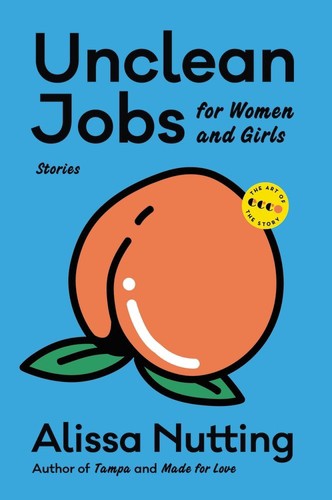interviews
Alissa Nutting on on the Horrors of Being a Woman on the Internet
The author of ‘Unclean Jobs for Women and Girls’ on the labor of performance

Alissa Nutting spent the last couple years crushing the literary landscape with her critically acclaimed, sometimes controversial novels Tampa and Made for Love. Banned in many bookstores, Tampa tells the story of an attractive, hebephiliac female teacher sleeping with her students, satirizing double standards for male and female sex offenders — and the role attractiveness plays in public perception. Made for Love covers slightly less controversial territory like technophobia and sexual attraction to dolphins. It made me laugh out loud often and inappropriately.

Alissa Nutting’s fiction debut, Unclean Jobs for Women and Girls, was published in 2010 by the now-defunct Starcherone Books; the original edition currently sells for over two hundred dollars on Amazon. This summer, Ecco reissued Unclean Jobs as part of their Art of the Story series.
Each story focuses on a woman with an “unclean job,” from familiar positions like “Zookeeper” and “Deliverywoman” to more disconcerting titles like “Hellion” or “Dancing Rat.” These jobs contaminate their heroines both physically (“Corpse Smoker,” “Gardener”) and emotionally (“Bandleader’s Girlfriend,” “Trainwreck”), lines often blurring between the two (“Cannibal Lover”). With varying degrees of realism, these stories pivot around women’s experiences of desire, autonomy, and authority.
Over the phone, Alissa Nutting and I discussed the reissue of Unclean Jobs, the horrors of being a woman on the internet, and our Domino’s Pizza Profiles.

Deirdre Coyle: In your new introduction to this collection, you say that “stories with fabulist, surreal, or strange premises that escape realism lift the veil of everyday order to gaze at everyday terror. What’s revealed to be most surreal aren’t the things that differ from reality — the odd settings or mythical beings — but the things that do not change no matter how bizarre the story’s world. Such as loneliness.”
This seems very applicable to your novels, Tampa and Made for Love — both have very surreal elements, although they aren’t works of fabulism. What do you think caused you to lean away from explicitly fabulist fiction?
Alissa Nutting: I think it was actually the novel form that caused that. What I love so much about fabulism is getting to exercise this premise. And I feel like they have various half-lives, but that normally the half-life is pretty short. It’s something that I still tinker with; I love the surreal so much that I’m not really able to write anything sustained without going back to it. In novels, the technique I’ve most often employed is digression — to find a space where, either by fantasy or desire or hypothetical what-if or anxiety, the character can think, ‘What if this surreal thing were to happen, or to come true?’ But I feel like that’s sort of the trade-off. What I love about fabulism and fabulist short stories is that leap into a premise that is already so set aflame, that it’s just gonna burn out after a few pages. And that’s glorious, but I just haven’t been able to sustain it outside of the short story without modifying it.
DC: In Unclean Jobs for Women and Girls, every story is given the title of an “unclean job.” So I wondered, where in the process of working on these stories did you come up with the concept of “unclean jobs”?
AN: This is clarity of hindsight, it definitely took me a long time to understand this, or begin to feel this. My most recent novel, Made for Love, was when I realized how much I write about performance, particularly being something for someone, or being a role in someone’s life or in society. That comes from my own real, flawed psychology. Growing up in a really religious household, I learned really fast how to pretend. And then that coping mechanism, I immediately began to deploy in other ways, in other really destructive ways in my life.
[Unclean Jobs] was my MFA thesis, when I was sort of conceptualizing — at the time, work was the first thing that came to my mind, like a job. In hindsight, maybe “the labor of performance” is a little more accurate for the things I was thinking about at the time.
Unclean Jobs is about the labor of performance, being something for someone, or being a role in someone’s life or in society.
DC: So it kind of happened naturally as you were working on these pieces?
AN: I think so. In some ways they’re all the same story, you know? In trying to find an agent, et cetera, there was this push to have it be a novel. And that didn’t work. But at the time, I was desperately thinking about ways that maybe it could. At one point it was titled ‘My Avatar.’ It was this implication that this was just me thinking myself into all of these various roles and places. And it has that immediacy of first-person-to-author that I think a lot of early writing does. But I was kind of limited by what I could do at the time. In some ways, my writing has gotten less overtly personal, but more implicitly super personal. Made for Love is probably the most personal thing I’ve ever written, and I could never do that at the time that I wrote the collection.
DC: How do you feel having this collection re-released into the wild in 2018, when your career is in such a different place?
AN: It’s a thing, you know? There is that sense of when you bring home a new significant other, and they find your family photos, and you’re seeing yourself before. You see all of the things that you didn’t know, or all the things you thought you knew. That’s definitely there. But I’m also incredibly grateful. The press that it was on [Starcherone Books] went under, and I’m really grateful that it’s there in the world.
In my own life and reading experiences, as a human and as an artist, many of the things I love most dearly are not the most perfect things, or that artist’s “best work,” or most masterful or most accomplished work. It’s easier for me to celebrate this vulnerability that I do see and still appreciate, and I think that has evolved in my work. From that point of view, I feel incredibly lucky.
DC: Did the collection change at all for the reissue?
AN: Yeah. I did some heavy editing. In its first publication, there was a transmisogynistic story that was horrific, every terrible misstep you can possibly do, taking on a point of view that I had no business taking on, with a lot of arrogance and non-research. Just so much ignorance at the time. I donated the advance for the reissue. It’s something I still rightfully think about every day, and really have informed my point of view in really good ways, both in my writing and outside my writing. That’s the biggest change that was needed when I realized the horrible thing I’d done. I stopped that printing with the small press. It really wasn’t anything that I was okay with being out in the world. So it’s nice to be able to have a copy of it that I feel good about giving to people, recommending people read.
Surveillance, Satire and the Female Body
DC: There’s this one section in the story “Cannibal Lover” that I can’t stop thinking about. The narrator says, “A lot of people use admiration to cope with mortality. Their thought process is that if they work hard and become good at something, or famous, or even if they just live a respectable life, that they’ll receive admiration from others and this will soften the ultimate blow.” I realize it’s beside the point, but I really wanted to be admired after reading that passage. Do you think admiration softens death’s ultimate blow? How do you feel about this now?
AN: I would be lying if I said that I wasn’t still desperately searching for what can soften it. And I do still definitely believe that admiration can soften it. But aging and getting older, I’m having to come to terms with the fact that I’m probably not going to be admired, so I’ve gotta start brainstorming other ways.
I’m super fortunate to have a daughter, and to have two step-kids. If I’m honest about why I came to parenting, you know, it was all the wrong reasons, and I think that it’d be dishonest for me not to acknowledge that a possible softening was really there. That having this part of you, these younger people that you devote yourself to and give yourself to in a very unique way — who go on, who exist after you — might be a solace.
But I feel like every softening thing I’m drawn to does the opposite. As a parent, you open yourself to lose everything. And for me, just that thought has made it harder. You know, I can’t even talk, I can’t even vocalize how difficult it would be to miss out. In summary, I think I’m really bad at finding this softening. Maybe that’s where the thinking and the reframing has to come — that it’s not softened. That’s more the space of acceptance.
Alissa Nutting Recommends a Story About the Aftermath of Abuse
DC: Last spring, you did this very funny tweet about taking your daughter to the dentist, which went viral [“My daughter started crying at the dentist office bc the dentist ‘is a boy’ and the dentist said ‘sorry, there are no girl dentists at this office’ & my daughter looked at me & said ‘why did we come here.’”]. And, of course, once it went viral, it was picked up on by assholes. I remember reading some of the backlash, mostly anti-feminist stuff. What was that like, and how long did it take your mentions to clear out?
AN: It’s funny because having been a woman on the internet for over a decade, I was really like — the frightening part, was, of course I’m also bad at a lot of parts of technology, like I had location whatever thing on, you know. The safety thing, obviously, that was the distressing component. But I immediately just muted it. And it was like, not even a thing. But my husband did not have the same strategy, and it was this kind of like complete, anxious, high-alert on his behalf, for a long time. And he was sort of doing these replies, and I was like, “Don’t engage, don’t engage!”
DC: Did your daughter know that her words had inspired a controversy?
AN: No, she doesn’t know what Twitter is. That’s a special time in one’s life.
DC: That’s a beautiful time.
AN: It’ll be a funny story for her. I think she will really appreciate it. She thinks that almost everything is hilarious. I love humor and comedy, but she takes it to the extreme. She’ll definitely think it’s funny later.
In novels, the technique I’ve most often employed is digression — to find a space where, either by fantasy or desire or hypothetical what-if or anxiety, the character can think, “What if this surreal thing were to happen, or to come true?”
DC: You’re a professor at Grinnell College now. Has your teaching life affected your writing life or writing process?
AN: Definitely. It’s a unique mode. There’s a mode of writing that I have in summers, in times when I’m not teaching in conjunction with writing, and then there’s the mode of writing that I have while teaching. It’s different but it’s also great. It’s definitely a wonderful and privileged opportunity to get to talk about fiction all day.
I mean, I have a lot of thoughts and feelings about the workshop model, and those are constantly evolving, in terms of thinking about class structure and best practices. But I will definitely say, and I tell this to my students all the time, that having to clearly enunciate what aspects of a story can be improved, and why, and how — I’m just constantly grateful for the epiphanic role that’s able to play in my own writing. Sometimes during class, I’ll finally get the clarity to say something that’s taken me ten years of thought. And the second class is over, I’m running to my office and writing it down and thinking about this great, brand new application that clarity’s given me in what I’m working on.
I have ADD, so hyperfocus is kind of the way and the space that I’m able to work. I’m really good in chunks. It’s hard for me to work for, like, an hour at a time over the course of the day. I need more of a submarine style of working, where I go under for a while and then resurface. Craft and teaching can be such a nice invocation to that spell of concentration, and going off to work. I feel really lucky. Speaking of jobs, I don’t think there are a huge number of jobs that I would be truly excellent at. But I do feel like I’m good at teaching.
DC: Do you think teaching is an unclean job?
AN: [Laughs.] I think if you do it right, it is. If you’re not being honest, if it’s too clean, you’re not opening yourself to the process and admitting how baffled you are as well. And you’re learning, too. The thing that’s been emerging for me for the past few years is that I’m teaching a model of learning. That’s something that I totally benefit from.
DC: I wanted to close with the most important question. I recently read a piece you wrote for Grub Street Diet, where you cataloged your food intake for a few days. You mentioned your Domino’s Pizza Profile, and I am totally obsessed with my Pizza Profile.
AN: Same.
DC: What’s your favorite order currently saved in your Pizza Profile? Mine’s feta, spinach, and sausage.
AN: Okay, so it’s a little gross. I love toppings — I love them. So I get the thin crust and then I get pepperoni, ham, black olives, green olives, green peppers, banana peppers. Sometimes I do pineapple too! [Laughs.] And onions. And then sometimes jalapenos. But I have all of them [saved]. So I have one that doesn’t have pineapple, but does have jalapenos. I have one that has both. I have one that has pineapple but not jalapenos. It’s a lot of toppings. You can see how it is such a time saver to have the Pizza Profile.
DC: That’s so many more vegetables than I put on my pizza. I’m very impressed. That’s really healthy.
AN: It’s the only way I eat vegetables, though, you know? Outside of pizza, it doesn’t really happen. Tacos, occasionally. It’s a surface area issue.








